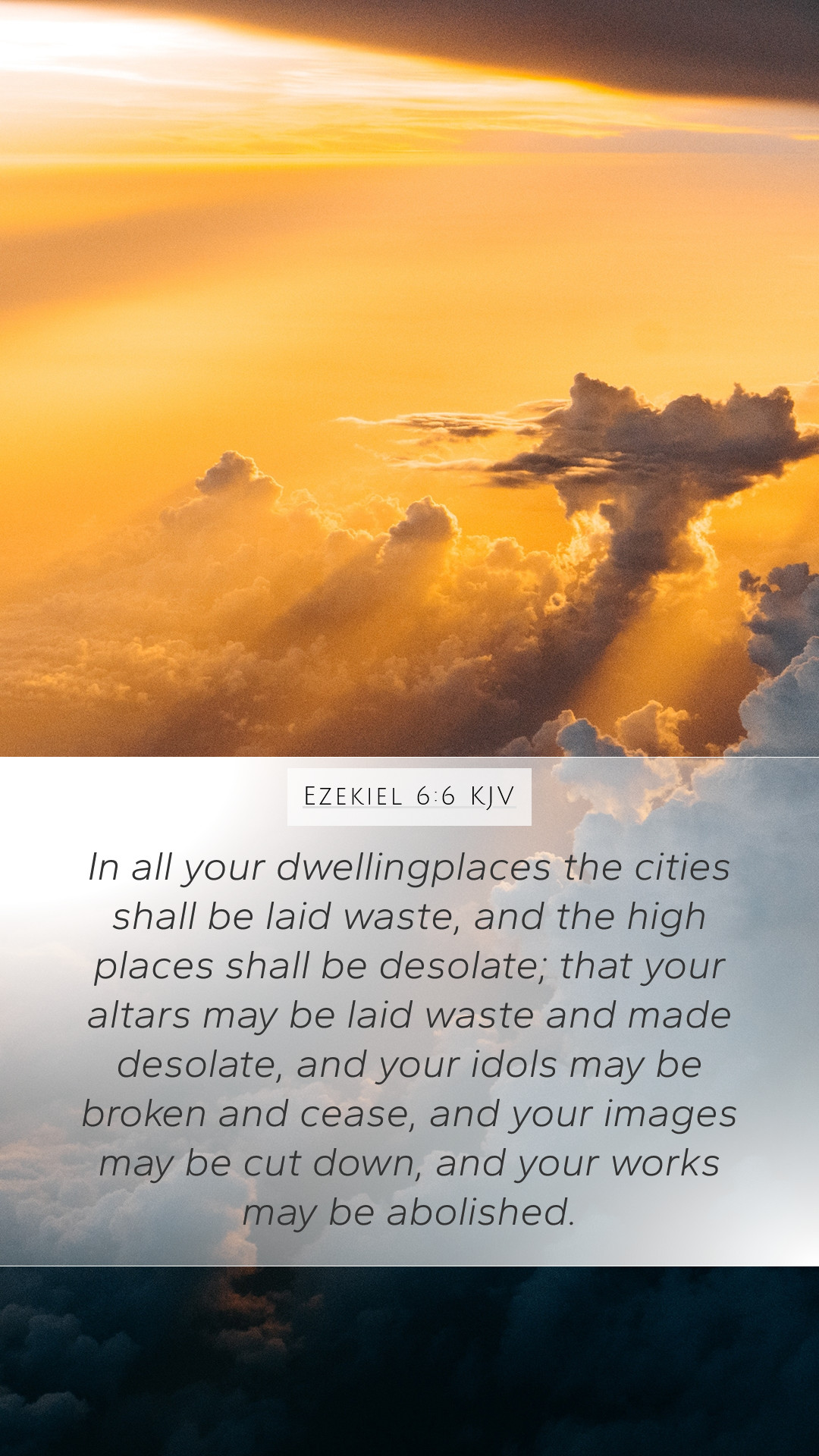Ezekiel 6:6 - Commentary and Insights
Ezekiel 6:6 states: "In all your dwelling places the cities shall be laid waste, and the high places shall be desolate; that your altars may be laid waste and made desolate, and your idols may be broken and cease; and your images may be cut down, and your works may be abolished."
This verse is a profound declaration of judgment against the idolatrous practices of the people of Israel. The Lord, through the prophet Ezekiel, emphasizes the total desolation that will come upon their dwelling places and the high places where they worship false gods.
Understanding the Context
The book of Ezekiel is situated during a tumultuous period for Israel and Judah, detailing God's messages of warning, judgment, and eventual restoration. The context of this verse signifies a climax of the prophetic messages concerning the consequences of idolatry.
Key Themes in Ezekiel 6:6
- Judgment: God is declaring a comprehensive judgment that will lead to the destruction of both physical and spiritual structures that supported idolatry.
- Idolatry: The high places mentioned are symbolic of the people's unfaithfulness. Their worship of false gods brought about divine retribution.
- Desolation: The desolation of cities and places of worship represents a stark reminder of the consequences of turning away from God's commandments.
- Restoration: Implicit in the judgment is the hope of future restoration; God’s ultimate plan includes bringing His people back to Himself.
Bible Verse Explanations
Combining insights from various public domain commentaries, we can delve deeper into the interpretation of Ezekiel 6:6:
Matthew Henry's Commentary
Matthew Henry emphasizes the seriousness of God's warnings through Ezekiel. He notes that the desolations are a natural consequence of the people's idolatrous practices. Henry points out that the destruction of high places, symbols of sinful worship, signals a profound shift in God's relationship with His people. The idea is not just about physical ruin but about the spiritual estrangement that idolatry brings.
Albert Barnes' Notes
Albert Barnes' interpretation highlights God's justice and righteousness. He stresses that the dismantling of idols and altars is indicative of a cleansing process. Barnes reflects that through this destruction, God is purging Israel of its sins, illustrating that true worship cannot coexist with idolatry. He underlines the importance of returning to worshipping God in spirit and truth.
Adam Clarke's Commentary
Adam Clarke provides a historic and societal analysis, indicating that the actions taken during this judgment carry significant consequences for future generations. He points out that this destruction serves as a warning to both the current and future adherents of the faith. Clarke emphasizes that the desolation foretold is both physical and spiritual, laying a foundation for understanding the need for repentance and return to faithfulness.
Application for Today
The significance of Ezekiel 6:6 transcends its historical context and invites modern readers to reflect on their relationship with God. Here are some applications based on the insights gained:
- Examine Idols: Just as the Israelites faced judgment for their high places, we must confront what takes precedence over God in our lives.
- Value True Worship: This verse invites believers to worship God genuinely, away from distractions and counterfeits.
- Seek Restoration: Acknowledging areas of desolation in our lives can lead to seeking God’s restoration and healing.
Cross-References
This verse can be linked to several significant scripture passages that deepen its understanding and provide broader context:
- Jeremiah 7:30-34: A parallel warning about the consequences of idolatry.
- Isaiah 65:3-5: God’s declaration of those who provoke Him with idolatrous practices.
- Hosea 10:8: The connection between idolatry and societal ruin.
Conclusion
Ezekiel 6:6 serves as a powerful reminder of the importance of fidelity to God and the consequences of spiritual complacency. The insights drawn from Matthew Henry, Albert Barnes, and Adam Clarke enhance the understanding of this verse, urging a reflective practice in worship and devotion.


